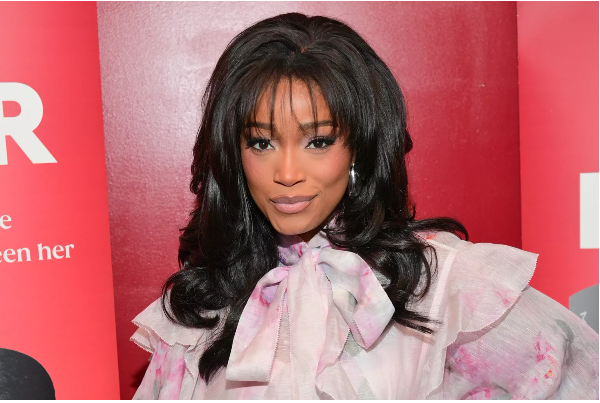Movies
Keke Palmer Reveals the Unique Compliment She Received from a Stripper: A Lesson in Impact and Identity
1. The Encounter: A Compliment from an Unexpected Source
It all started when Keke Palmer shared a personal story during an interview with actress and writer Issa Rae. Palmer recalled a moment in which she was approached by a stripper at a club. The woman, seemingly in awe of Keke Palmer’s work, expressed admiration for her role in the 2006 film Akeelah and the Bee. What made this compliment stand out, however, was the stripper’s revelation that she had almost chosen “Akeelah” as her stripper name. Palmer, who has often spoken about her desire to be recognized for her authenticity, was both surprised and touched by this sincere acknowledgment.
For many, the notion of a stripper being impacted by a family-friendly movie like Akeelah and the Bee may seem surprising. The film, which tells the story of a young girl from South Los Angeles who overcomes the odds to compete in the Scripps National Spelling Bee, is often viewed as a heartwarming underdog tale, not typically associated with the world of adult entertainment. The fact that this stripper found resonance in such a film speaks volumes about the film’s cultural significance. It’s a reminder of how art can transcend boundaries and connect with people from all walks of life.

2. The Significance of “Akeelah and the Bee” and Palmer’s Early Career
In order to fully understand the impact of this compliment, it is essential to reflect on the significance of Akeelah and the Bee in Keke Palmer’s career and the broader cultural landscape. Released in 2006, Akeelah and the Bee was more than just a film about spelling; it was a celebration of resilience, intelligence, and the strength of community. Palmer’s portrayal of Akeelah Anderson, a young girl from a challenging background who uses her passion for words to defy the odds, resonated deeply with audiences. For many young people, particularly those from marginalized communities, Palmer’s portrayal of Akeelah was empowering. It showed them that success was possible, even in the face of adversity.
Palmer, at the time, was still a rising star, having already impressed audiences with her roles in films such as Barbershop 2: Back in Business and TV shows like True Jackson, VP. However, it was Akeelah and the Bee that truly solidified her status as a role model. For the stripper who approached Palmer, the film’s message of hope and determination clearly had a profound impact. The fact that she considered adopting the name “Akeelah” in her work shows how deeply the character resonated with her on a personal level.
The world of entertainment, including adult spaces like strip clubs, is often thought of as a place where mainstream ideals don’t necessarily align with societal expectations of success. However, for this woman, the character of Akeelah became a symbol of empowerment. It’s a poignant reminder that entertainment, in all of its forms, can shape and redefine our understanding of identity.
3. The Power of Representation in Media
Representation in media is an ongoing conversation, one that has become more important than ever. For years, Hollywood has been criticized for its lack of diversity and its tendency to favor stories that don’t reflect the lived experiences of many communities. Keke Palmer’s career has, in many ways, been a testament to the power of representation. As a Black woman in Hollywood, she has broken barriers and created space for herself, refusing to conform to the industry’s limited vision of who can be a leading lady.
When Palmer first rose to prominence, she became an icon for young Black girls who rarely saw themselves represented on the big screen. Her work in both television and film showcased the complexity of Black identity in ways that resonated across different communities. The compliment from the stripper, and the fact that she almost adopted Palmer’s character as a persona, underscores the way in which media representation can ripple out to impact people in all walks of life.
Representation isn’t just about seeing people who look like you; it’s about feeling seen, heard, and valued. For this woman, Keke Palmer and the character of Akeelah represented something larger than just a film or a role. They represented the possibility of breaking free from societal limitations and embracing one’s own power, regardless of background or occupation. This is the power of representation in media: it allows people to see themselves as capable of more.
4. Keke Palmer’s Journey: From Child Star to Cultural Icon
While the compliment from the stripper speaks to the widespread impact of Akeelah and the Bee, it also highlights the broader journey of Keke Palmer’s career. From her early days as a child star in the 2000s to her current role as an entrepreneur, activist, and actress, Palmer’s career has been marked by a commitment to authenticity and breaking barriers.
Palmer’s journey into the spotlight began when she was just a child, starring in Disney Channel movies and TV shows. However, it wasn’t long before she realized that Hollywood often tries to pigeonhole young stars, especially women of color, into specific roles. Rather than conform to these expectations, Palmer carved her own path, embracing roles that allowed her to explore the full range of her talent. Her work in films like Akeelah and the Bee, The Longshots, and Joyful Noise helped to establish her as a versatile actress capable of playing complex characters.
In addition to her acting career, Palmer has also ventured into music and entrepreneurship. Her ability to navigate these multiple roles while staying true to herself is a testament to her resilience and vision. Her story shows that success in Hollywood isn’t just about fame; it’s about making an impact and creating a legacy. The compliment from the stripper is a reflection of that legacy—one that transcends the traditional boundaries of fame and reaches people from all backgrounds and walks of life.
Moreover, Palmer has been an advocate for mental health and body positivity, using her platform to discuss issues that affect many young people today. This openness about her personal struggles and triumphs further enhances her role as a cultural icon. The compliment she received is not just about a specific film; it’s about the broader message of empowerment that Palmer continues to promote in her career.
5. Lessons in Identity and Empowerment: The Stripper’s Compliment and Its Lasting Impact
The compliment Palmer received serves as a powerful reminder that we never know who we might impact with our work. The stripper’s admiration for Palmer’s role in Akeelah and the Bee shows how art can transcend its intended audience, touching the lives of people who may seem worlds apart from the original context. The compliment also highlights a central theme in Palmer’s career: the importance of staying true to one’s identity, even when faced with expectations to conform.
In today’s world, where so much of the media landscape is dominated by cookie-cutter depictions of success, Palmer’s ability to remain authentic is something to be celebrated. Her willingness to take on roles that challenge stereotypes and push boundaries is part of what makes her such a beloved figure. The stripper’s compliment shows that Palmer’s influence extends beyond the world of traditional Hollywood—her work has touched the lives of people in unexpected places, offering them hope and inspiration.
At its core, this story is about the power of representation, the importance of authenticity, and the lasting impact that one person’s work can have on the world. Whether it’s through a film, a song, or a conversation, we all have the ability to inspire others. Keke Palmer’s story—and the compliment she received—serves as a reminder that our identity is shaped by the people we encounter, the stories we tell, and the courage we have to remain true to ourselves.
From: Doublejoydesigns
